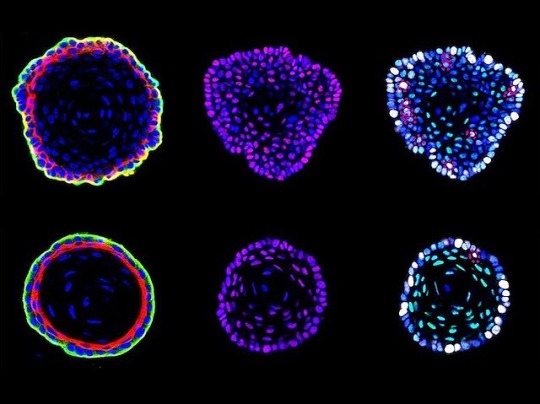#Esophagus
Explore tagged Tumblr posts
Text
138 notes
·
View notes
Text

#digestive system#esophagus#stomach#large intestine#small intestine#rectum#anatomy#educational#3d gif#transparent gif
107 notes
·
View notes
Text
I was today years old when I found out my immune system is trying to kill me with allergic responses to simply existing
#eczema#asthma#GI issues#esophagus#my entire body is in crisis mode#and i am paying the price for it#not diagnosed yet#but my mom is#and its genetic#pending diagnosis
13 notes
·
View notes
Text

Preserving Pipework
A protein called Troy (Tnfrsf19) defines a population of progenitor cells that have a key role in the maintenance of the lining of the oesophagus [food pipe]
Read the published research article here
Image from work by David Grommisch and colleagues
Department of Cell and Molecular Biology, Karolinska Institutet, Sweden
Image originally published with a Creative Commons Attribution – NonCommercial – NoDerivs (CC BY-NC-ND 4.0)
Published in bioRxiv, March 2024 (not peer reviewed)
You can also follow BPoD on Instagram, Twitter and Facebook
11 notes
·
View notes
Text

the hoard
3 notes
·
View notes
Text
Panini
The Homo sapien just ate a super dry panini. The esophagus was not doing well trying to get it to the stomach, but it managed. But man, I wish that this person could just eat something better for their body!
#digestion#eat healthy please#this person is a weirdo#homo sapiens#amiright#organblr#organ tumblr#stomach#esophagus
2 notes
·
View notes
Text
THE ESOPHAGUS APPOINTMENT HAS BEEN SCHEDULED!!!!!!!!!!!!!!!!! OHH MY GOD IM UNPREPARED FOR WHAT ILL FIND DOWN THERE. I have to wait all the way until september though so thats kind of annoying
Esophagitis dont cause my demise please I beg
4 notes
·
View notes
Text

Esophagus from Meomi!
2 notes
·
View notes
Text
Just a side note but the word esophagus is fucking hilarious lol. I’ve been sitting here laughing at it for like 5 minutes now. Like. ESOPHAGUS.
3 notes
·
View notes
Text

I nearly spat my tea reading your tags....perfect. Thank you.

#Reblogging for reasons#Scormophgogus#Sarcophagus#Esophagus#Mummy in the Tummy#if just a bit further down#amazing#Love this#Thank you all for for this lovely post#Did wonders for my mental health today#Tumblr inhabitants are the best
65K notes
·
View notes
Text
y’all how do i get over my fear of anesthesia and getting put to sleep in the next few hours 😭 bc if i don’t get this endoscopy i fear i am actually going to die but if i do get it im also scared im gonna die. i have tried everything to get rid of this fear but i can’t live with these symptoms anymore idk what to do
#endoscopy#anesthesia#esophagus#idk#help#chronic illness#love when i’m so mentally ill i can’t get medical care#but also doctors are psychos so it’s not even my fault
0 notes
Text
For My Health
*Freeze frame* *Record scratch* The view from my hospital bed. Yup, that’s me. You’re probably wondering how I ended up in this situation. This is a failure of sorts. Not hereditary, so I can’t blame my family. No known cause or trigger, so no big regrets. I sleep with a wedge and have an eating schedule that rivals a Mogwai—no late-night snacks. No prevention, no cure—just a wonky lower…

View On WordPress
1 note
·
View note
Text

do i have a petz type
1 note
·
View note
Text


just got done with my billionth endoscopy over the course of my life so far. currently in bed relaxing now with a swollen & irritated esophagus. everything went well though, and surprisingly this time i somehow don’t even have a blister on my lip from it😂 the anesthesia they use to sedate me always makes me feel so emotional after. thinking about so much right now even in the hazy state i’m in. the photo next to the pic of me is a photo of kurt cobain post endoscopy. one of my greatest heroes. kurt suffered from a stomach condition, and although he didn’t have the same illness as me, i’ve always related to him so much in that aspect. i’m truly thankful that kurt has brought so much healing to my soul over the years through his art. ✨ it’s hard to be someone who is such a mess all the time, my body constantly fighting against me. today before my procedure, my doctor spoke to me about how if i don’t get some relief soon from the esophageal dilation and new stomach acid medication, i could definitely be looking at traveling to a specialist & having another huge operation done..something i have always wondered if i would ever hear again. and then it hit. and it hit hard when i heard the words. because suddenly i was a scared 10 year old girl again..hearing that she needed a big operation to be able to have any quality of life. i have always feared going through the hell of what i went through again. being on a morphine pump for days, in and out of consciousness and writhing in pain when i wasn’t severely fucked up. that operation changed me, and the fear of hearing i may have to go through it again is very real and unsettling. i am so thankful for the health i do have..i try to count my blessings every single day on this planet. all of us are going through something, this is just a part of my story..✨
#p0is0ngirlx#achalasia#autoimmine disease#rare illness#disease#achalasia survivor#digestivehealth#stomach issues#esophagus#esophageal#barretts esophagus#achalasia cardia#achalasia fighter#endoscopy
6 notes
·
View notes
Text
Best Esophageal Cancer Treatment Hospitals in Vijayawada | Punarjan Ayurveda
Visit Punarjan Ayurveda Hospitals for the Best Esophageal Cancer Treatment Hospitals in Vijayawada. We offer unique and integrative treatments that combine various methods to combat cancer effectively. With over 100,000 patients treated and a high recovery rate, we are a leading center for endometrial cancer care. You can get our help both in person and online. We make sure you get the best care possible by using cutting-edge technology and Ayurveda. Our Vijayawada Hospital’s goal is to help you get better quickly and stay healthy in general.
For more information Visit https://www.punarjanayurveda.com/vijayawada/esophageal-cancer-treatment-hospitals/
0 notes
Text
Health IT: Investment funds plan to take company R1 RCM private in a deal valued at nearly $9B

- By InnoNurse Staff -
Health IT company R1 RCM will be acquired for $9 billion and taken private by investment funds connected to TowerBrook Capital Partners and Clayton, Dubilier & Rice.
The acquisition price of $14.30 per share represents a 29% premium from late February.
TowerBrook already holds a 36% stake in R1 RCM, which serves over 3,700 hospitals and 30,000 doctors with billing and revenue collection services.
The deal, valued at approximately $8.9 billion, has been approved by a special R1 board committee and awaits shareholder and regulatory approval. The company expects the deal to close by year-end.
Read more at ABC News/AP
///
Other recent news
A new PET/MRI probe could lead to the early detection of hidden diseases (Institute of Organic Chemistry and Biochemistry of the CAS/Medical Xpress)
New AI tool streamlines heart monitoring: fewer leads, same accuracy (Scripps Research)
OneBlood suffers a ransomware attack; the status of donor data remains uncertain (Fierce Healthcare)
Decoding life: A new AI model uncovers DNA’s hidden language at the Biotechnology Center of TU Dresden (TU Dresden)
An experimental AI method enhances doctors' ability to diagnose esophageal cancers and precancers (Medical Xpress)
AI can predict male infertility risk using a blood test, eliminating the need for semen (Toho University/Medical Xpress)
Clinical speech-to-text: African health tech startup Intron Health secures $1.6 million in pre-seed funding to develop AI for global health (TL Tech Labari)
#health it#fintech#billing#r1 rcm#rcm#medtech#diagnostics#mri#imaging#radiology#oneblood#ransomware#cybersecurity#health tech#cardiology#ai#dna#cancer#oncology#esophagus#fertility#africa#voice technology#Intron Health
0 notes